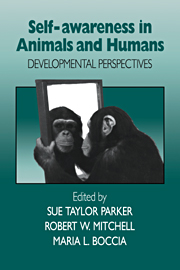Book contents
- Frontmatter
- Contents
- Contributors
- Foreword, by Louis J. Moses
- Acknowledgments
- Note added in proof
- Part I Comparative and Developmental Approaches to Self-awareness
- Part II The Development of Self in Human Infants and Children
- Part III Self-awareness in Great Apes
- Part IV Mirrors and Monkeys, Dolphins, and Pigeons
- 21 The monkey in the mirror: A strange conspecific
- 22 The question of mirror-mediated self-recognition in apes and monkeys: Some new results and reservations
- 23 Mirror behavior in macaques
- 24 Evidence of self-awareness in the bottlenose dolphin (Tursiops truncatus)
- 25 Mirror self-recognition in bottlenose dolphins: Implications for comparative investigations of highly dissimilar species
- 26 Further reflections on mirror-usage by pigeons: Lessons from Winnie-the-Pooh and Pinocchio too
- Part V Epilogue
- Author index
- Subject index
26 - Further reflections on mirror-usage by pigeons: Lessons from Winnie-the-Pooh and Pinocchio too
Published online by Cambridge University Press: 24 November 2009
- Frontmatter
- Contents
- Contributors
- Foreword, by Louis J. Moses
- Acknowledgments
- Note added in proof
- Part I Comparative and Developmental Approaches to Self-awareness
- Part II The Development of Self in Human Infants and Children
- Part III Self-awareness in Great Apes
- Part IV Mirrors and Monkeys, Dolphins, and Pigeons
- 21 The monkey in the mirror: A strange conspecific
- 22 The question of mirror-mediated self-recognition in apes and monkeys: Some new results and reservations
- 23 Mirror behavior in macaques
- 24 Evidence of self-awareness in the bottlenose dolphin (Tursiops truncatus)
- 25 Mirror self-recognition in bottlenose dolphins: Implications for comparative investigations of highly dissimilar species
- 26 Further reflections on mirror-usage by pigeons: Lessons from Winnie-the-Pooh and Pinocchio too
- Part V Epilogue
- Author index
- Subject index
Summary
In the Disney film version of Milne's (1958) Winnie-the-Pooh there is a scene where Tigger (a tiger) introduces himself to Winnie, or Pooh bear, as being unique. “I'm the only one!” he announces proudly. Pointing to a mirror in which Tigger's appearance is reflected, Pooh responds by asking, “Then, who's that?” Tigger's response is interesting. Instead of reasoning that the mirror image is a reflected identical representation of himself – he is, after all, unique – he concludes instead that it must be an impostor. His subsequent attempts to threaten this other animal succeed only in scaring himself under a bed. Pooh's behavior toward his own mirrored reflection also is interesting. When some of the sewing on his back comes undone – he is a stuffed teddy bear – Pooh uses the mirror to guide his efforts at repairing that area of his body that he otherwise cannot see directly. After finishing this task, Pooh turns, faces the mirror directly, and says, “Thank you.” Pooh's behavior suggests that he recognizes the functional significance of the spatial invariants between objects in space, including his body, and their images reflected in the mirror. However, he nevertheless perceives the image as “other” and fails to recognize that it is simply a representation of himself. Pooh doesn't grasp the fact that he is literally talking to himself (cf. Jaynes, 1976). Pooh was, after all, “a bear of very little brain” (Milne, 1958).
Information
- Type
- Chapter
- Information
- Self-Awareness in Animals and HumansDevelopmental Perspectives, pp. 392 - 410Publisher: Cambridge University PressPrint publication year: 1994
Accessibility standard: Unknown
Why this information is here
This section outlines the accessibility features of this content - including support for screen readers, full keyboard navigation and high-contrast display options. This may not be relevant for you.Accessibility Information
- 14
- Cited by
